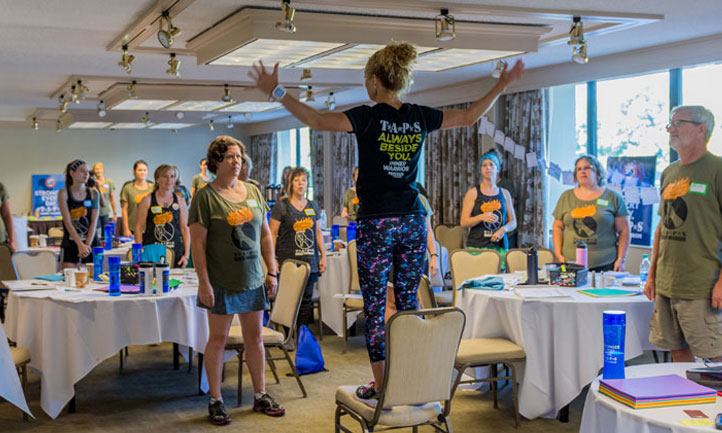Showing up for Yourself
Authors: Emily Munoz , Nichole Bukowski
The grief journey requires us to do a lot of things we’d rather not: face uncertain futures, grieve deeply, learn to ache. And regardless of how little we want to face the tasks of mourning, at some point we have no choice. However, the energy required to face grief’s demands can draw on our willpower to make decisions, especially those that take advantage of life’s opportunities.

Just as the demands of grief call us to “show up” when we’d rather not, the tasks of life call us in a similar way. But, showing up requires resolve; it requires purpose when we may feel our least purposeful. So, why push ourselves? Why not take the path of least resistance?
Because showing up - for ourselves, for others, for our TAPS family – is a pathway to healing. It’s the equivalent to sending ourselves a love note saying, “I still believe in you. You matter. You are worth this investment. You deserve to heal.”
Showing up requires investment, vulnerability and courage. Yet, it can challenge us in many ways and what is challenging is also rewarding. Showing up, opens possibilities to build connections, resilience, grit, strength, self-compassion and self-acceptance.
So, what does it mean to show up when you’d rather bow out?
When you have to choose whether or not to show up, base your choice on where the healing, or the possibility of healing, lies. Even if your expectations aren’t fully met, you bring your hidden strength forward a little each time you show up.
It takes effort, part of which means harnessing our fighting spirit, our “inner warrior.” It’s also about kicking out the “squatter emotions” – those uninvited thoughts that want attention, batter away at our reserves and take up space that could be used for building strength instead.
Each time we force out a squatter emotion, even if it’s just for a moment, we build confidence for survival and renewal. We learn, little by little, to move through the emotions that bring about challenge and pain, and orient around the ones that offer fulfillment and joy. We begin to recognize doubt and fear as visitors, not permanent fixtures.
We’ve all had a moment when we’ve mentally or physically paused – phone in hand, ready to call and cancel. What are some of the emotions that led us to that point? Hopelessness? Fear? Self-doubt or shame? When we come to a moment of detachment – a temptation to bow out of something that may help us heal or feed our soul – it could be pulling us away from possibility, investment, camaraderie or hope, things that bring us joy, just because we don’t feel perfect, prepared or proud.
When we acknowledge real feelings and face the deep-down fears, we confront uncertainty and learn to recognize the squatter emotions for what they are. We become less rattled each time one tries to keep us from reconciling grief, life or our own truths. We know that moments of hiding and isolation appear to be the best choices, but in actuality debilitate us.
But, showing up doesn’t always mean doing, attending or completing. There are no definitive finish lines in grief; and unfortunately, the cure for the pain is the pain. So sometimes, showing up is about just being present in your own grief and in your own life, and facing it the best way you can.
When we show up – whether it’s coming to an event or arriving at our truths – we take our place in a community of others who have opened themselves to the same kind of challenge. When this happens, you feel the support of friends, community and your TAPS family. Maybe it’s the cheer of a stranger as you walk your first 5K, or maybe it’s the welcoming hug of a peer mentor at a community care group.
Showing up means turning toward others, as Desmond Tutu writes in “The Book of Joy: Lasting Happiness in a Changing World,” “You show your humanity by how you see yourself not as apart from others but from your connection to others.”
As you show up and connect, you’re able to tap into the resources of your community. You’ll require less to go onward, as the energy of others will pull you forward.
Trust those who help you trust yourself and your own ability. If you don’t know who they are yet, turn toward connection and you will find them. They will tell you that being present is better than being perfect. Listen to the people who want you to show up messy, sweaty and tear-stained, feeling like you’re not ready – the people who know you’ve shown up scared.
Doing constructive, emotionally challenging things when you’d rather not, shows your ability to persevere is alive. And soon, you’ll start to believe it too.
From the pen of…
Emily Muñoz, Director of TAPS Health and Wellness Initiatives, is living a personal campaign to be the person her late husband Army Capt. Gilbert Muñoz loved – and is using the Inner Warrior program to empower survivors to do the same.
Nichole Burkowski is an experienced athlete, yogi and health and wellness educator, who serves TAPS as the Program Manager for Health and Wellness and an Inner Warrior Program Coach. She uses powerful movement and purposeful release to help survivors identify life skills, find momentum and rediscover their best selves.
